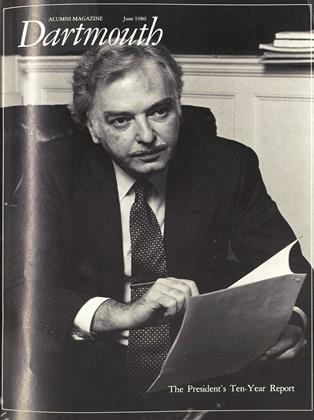Lowering skies and warm feelings
The Kemeny commencement magic lasted ten years. Then, on the 11th try, the exercises were driven inside by lowering weather for the first time to Thompson Arena, which was used for this purpose for the first time.
There was another first. Near the end of the program the graduates and the audience joined in singing "Men of Dartmouth," as they always do. But this time there was a new verse added, written by some women in the graduating class of 1980.
There were some old standbys, too. There was the affecting sight of the robed graduates linking arms and swaying in time to the alma mater. There was the golden retriever-ish dog that led members of the graduating class up the aisle to their seats and then flaked out in the aisle after some amiable barbering with the crowd. And there were the color and sounds and pleasant lump-in-the-throat emotion of commencements.
Somehow the chairs on the floor of Thompson, where once the Brownridges, Ryersons, and Murphys cavorted, seemed more impressive when viewed from above in Thompson than from the side on Baker's lawn. There they stretched away, with the diploma tubes underneath them and the programs tidily on the seats.
Those programs have traveled a long and arduous road to get on those seats. About a month before commencement, College Editor Josh Hill '56 starts feeding information into a computer in a type- setting format. The graduate schools which historically seem to have little attrition as graduation nears (Tuck, Medical School) are fed in first.
The undergraduates, the largest and for some reason the most fluid group, cause Hill the most last-minute headaches. ("One of the biggest hassles is honors and distinctions they aren't settled until late Thursday night before commencement.")
Other late-blooming entries are the Phi Beta Kappa list and the undergraduate prizes. Eventually, all of this information comes out on a perforated paper tape, which is sent off to Dartmouth Printing and run through its typesetting equipment.
The last 36 hours or so are sleepless, nail-biting ones for • Hill. Deadline for changes is Friday noon. Printing (9,000 copies) takes place Friday evening. Programs are bound Saturday morning and picked up by a Buildings and Grounds truck in the early afternoon and held there until' it is decided Sunday morning where commencement is going to be. That's how they tidily make it to those chairs.
Once the ceremony was underway, •' went smoothly. Reflecting on evidence o! only meager correlation between success in college and in "the real world," valedic- torian Richard Braverman expressed alarm over "the paralyzing self-doubt, "the strategies of procrastination and over- caution," a lack of "independent creative thought" or the vacillation by which "college can transform an ingenuous youngster into an effete, impotent adult," then went on to commend Dartmouth's ef- forts to "avoid many of the pratfalls of traditional education."
President Kemeny urged the graduates not to let their brains atrophy through dis- use; to find room in their lives for public service; to set goals "worthy of your ability"; to retain the thirst for knowledge, "a thirst that is best if it is never quenched"; and not to compromise or make excuses. "No one," he said, "will force you to do what you should do. Your motivation must now come from within. The only failing grade you will receive in life you will receive from yourself."
Throughout the exercises there was the tension of wondering whether Arthur Ashe, the elegant tennis player who was voted an honorary doctor of arts, would make it. His plane from Texas was running late and, as the relays of readers chanted out the names of the graduates, eyes were drifting to the back of the platform to see if he would miraculously appear.
He didn't after three tries at Lebanon airport. But the intrepid Ashe was set down in Manchester, New Hampshire, where he rented a car and drove northward, missing the commencement ceremony but making the post-commencement .luncheon. There, before a crowd of about 200, John Kemeny and Provost Leonard Rieser '44 donned academic robes, made the appropriate in- cantation, and placed the doctor of arts hood about Ashe's shoulders.
It was a good end to a good commence- ment. You would have liked it.
The moodwas infectious, as a pair of newly minted doctors proved on the platform.
"When the seniors linked arms and sang 'Men of Dartmouth,' it was wonder-fully moving, said a member of the class of 1926 after commencement.
Article
-
 Article
ArticleBroadcast to Dartmouth, England
December 1941 -
 Article
ArticleNashua
OCTOBER 1962 By DOUGLAS D. PERKINS ’53 -
 Article
ArticleThe Canoe Club
June 1947 By Pete Owen '47 -
 Article
ArticleThe Undergraduate and His College
November 1928 By President Hopkins -
 Article
ArticleMILESTONES
FEBRUARY 1932 By W. H. Ferry '32 -
 Article
ArticleCLASS OF 1878
June 1916 By William D. Parkinson









